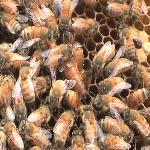May 04, 2011

ored with Tyler Environmental Prize
Bees play an important role in agriculture, pollinating crops and providing us with the natural sweetener, honey. Environmental stresses are taking their tolls on the insects, however, and this year's Tyler Prize for Environmental Achievement has gone to researcher May Berenbaum, who is studying solutions to the bee crisis.
May Berenbaum says that for thousands of years, people have had an adversarial relationship with bees, because they sting.
"But on the other hand, people all over the world have developed a dependency on the honeybee because it is really the world's premier managed pollinator," noted Berenbaum. "And here in the US, for example, over 90 crops depend on honeybees for pollination services."
Berenbaum says farmers rely on bees to pollinated crops from nuts to melons. They are directly responsible for pollinating $19 billion worth of crops in the United States alone, each year.
But many bees have been lost in recent decades in what scientists call "colony collapse." The worker bees suddenly disappear, and the colony dies. In North America, it has been a problem especially in the past five years. Although scientists don't completely understand the problem, Berenbaum says there are many likely reasons for the collapse. One is the long-distance transport of bees for pollination and the spread of bee diseases from one region to another. She says the toll of disease is worsened by the buildup of pesticides in bee colonies.
As scientists like Berenbaum study the problem, she says consumers can help.
"You can buy local honey," noted Berenbaum. "Local honey is available at local stores only because there is a local beekeeper who went to the trouble of harvesting it, so the more beekeepers there are, the more honey there is. We have, over the last 25 years, seen an alarming decline in the number of beekeepers. The interest is resurging, which is the best news for American bees, actually, more beekeepers."
Berenbaum says people can also help the honey bee by planting more flowers and becoming more tolerant of weeds, some of which offer food for pollinators like bees.
The bee researcher was in Los Angeles to accept the Tyler Prize for Environmental Achievement, which is administered by the University of Southern California. Previous recipients include the biologist Edward O. Wilson, the primatologist Jane Goodall, and conservation biologist Paul Ehrlich. She says these and other winners are among her scientific heroes.
She says the $200,000 cash award that comes with the prize will help expand a project of hers involving citizen-scientists.
"We have one project called bee-spotters, which is now restricted to Illinois, where we ask people to go out with a digital camera, even a cell phone, and photograph either bumblebees or honeybees," Berenbaum noted.? "A citizen-scientist outside Peoria actually sent in a photograph of a species of bumblebee, the rusty patched bumblebee, bombus affinis, that was thought to have gone extinct in that area, and was recovered by a private citizen with a digital camera."
She says not least among the contributions of the bee is the honey it produces, in infinite variations.
"Every frame of honey out of a honey bee hive is a little different," Berenbaum explained. "It reflects the flowers that went into it. So if you like total control over your cooking, then sucrose, tale sugar, is for you, but if you like a little variety, you can't beat honey."
May Berenbaum has compiled a collection of recipes using honey in the book Honey, I'm Homemade: Sweet Treats from the Beehive, Across the Centuries and Around the World. The scientist notes that the honey bee, besides its important work as a pollinator, makes our lives a little sweeter.